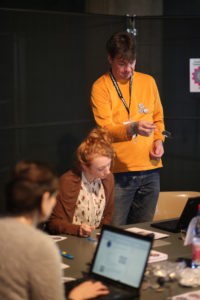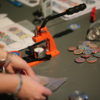“Surveillance, cryptography, terrorism, malware, economic espionage, assassination, interventions, intelligence services, political prisoners, policing, transparency, justice and you.
Structural processes and roles are designed to create specific outcomes for groups. Externally facing narratives are often only one of many and they seek to create specific outcomes by shaping discourse. We will cover a wide range of popular narratives surrounding the so-called Surveillance State. We intend to discuss specific historical contexts as well as revealing new information as part of a longer term research project.” (CCC 2014)
“Freedom in your computer and in the net
For freedom in your own computer, the software must be free.
For freedom on the internet, we must organize against
surveillance, censorship, SaaSS and the war against sharing.
To control your computing, you need to control the software that does it. That means it must be _free software_, free as in freedom. Nonfree software is inherently unjust, and nowadays is often malware too. We developed the GNU system as a way to avoid nonfree software on our computers.
That assumes you’re running your own copy of the programs. That means shunning Service as a Software Substitute, where someone else’s copy in someone else’s server does your computing.
Beyond that, we face the danger of censorship, and surveillance both on and off the internet. Lurking behind them is the menace of the War on Sharing, the publishers’ decades-long campaign to control what we do in our computers. Increasingly, computer hardware itself is becoming malicious.” (CCC 2014)
Plus the Offline Network session took place. There will be a follow up session during Transmediale 15, so stay tuned:
The future is offline! An assembly all about offline networks.
Everyone interested in the growing offline networks community is welcome!
Basic concepts:
- Community developed and running networks which enable citizens to gain benefits from networked infrastructures, while maintaining control of their data and how it is used.
- Community networks do not need to be connected to the wider internet (hence “off-nets”), however they may have connection hubs with the internet. Off-nets may be complementary to the internet, as well as an alternative.
- off-nets and the internet are not necessarily mutually exclusive, and can work together to offer more robust benefits to its participants.
- (A poetic approach): in particle physics, the “observer effect” is when an electron, whilst under observation, alters its course due to the fact that it is being observed. in contemporary society, people might alter their habits due to the idea that they coud be observed. What if there were islands within the monitored, fungible, and quantified world that permitted human to interact with each other unobserved, albeit digitally? What sort of unexpected reactions would that cause?
- One of the central characteristics of offline networks is that they are offline. We can‘t possibly anticipate all the reasons why people or groups would need to operate offline. Therefore it would be important to design applications that can be appropriated, adapted and used as “infrastructure”.
- Keywords: #diversity #serendipity #intimacy #temporality #place
Offline Networks Manifesto
The future is offline.
(Mark Gaved: ) 1. Community developed and run networks enable citizens to gain the benefits from networked infrastructures while maintaining control of their data and how it is used.
(Mark Gaved: ) 2. Community networks do not need to be connected to the wider internet (hence “off-nets”), however they may have connection points with the internet
(Mark Gaved: ) 3. Off-nets may be complementary as well as an alternative to the internet: these are not necessarily mutually exclusive, and may work together to offer greater benefits to participants
Bezdomny (A poetic appraoch): in particle physics, the “observer effect” is when an electron, whilst under observation, alters its course due to the fact that it is being observed. Elsewhere, people might alter their courses in life due to the idea that they are being observed. What if there were islands within the monitored, fungible, and quantified world that permitted human to interact with each other unobserved, albeit digitally? What sort of unexpected reactions would that cause?
Addie (underlying infastrutucre/why) The feedback system built into traditional networks necessitates the sharing of information. A problem arises, however, when the distribution of metadata conflicts with the notion of transparency —a core ideological component of the value of cultural neutrality. Since the principles of global capitalism and government can now determine value based on data, we are left with a fundamental friction in the distribution and creation of culture through networks. Off-nets will focus on the contradiction of creation and control by exploring new forms of networks and access.
Panayotis (brainstorming): Offline networks keywords: diversity, serendipity, intimacy, temporality
(Andreas Unteidig): One of the central characteristics of offline.networks are that they offline. We can‘t possibly anticipate all the reasons why people or groups would need to operate offline, hence it would be important to design applications that can be appropriated, easily altered and used as “infrastructure” for many different scenarios of use.
(Matthias) Maybe we can create a “best practice to your offline app” list. This can contain pitfalls like try to request a fontset from google 🙂
(Matthias) We should maybe add some development rules, which says “don’t be evil” and should promote certain mind sets about problematic functionalities. On bad example is: Create a Facebook login page to fish username & passwords ==> I can do this with PirateBox in 10 Minutes (that it looks confident)….
IMHO: We have to point out that having an offline.network is a responsibility for all the other projects. If the reputation of offline.network is damaged because of such an action, we can all stop trying to recover it…
Another point is, that this manifesto should be in a form, that you can make it easily available on the offline device like “learn more about offline networks”, and it should include a link list for further informations.
Maybe we need a “ruleset” or “guidlines” , that each devices behaves the like the same.. like a Hotel captive portal on the first access (which may not fit on each concept, I think).. this can be a good to have rule.
(Panayotis): One challenge is that you can never control what others are doing. Creating rules could make things worse (because people could develop some level of trust and thus make it easier to cheat). In my opinion it is better to uncover the whole informality and lack of control in order to make everyone responsible and cautious. One way to do this is to rely on face-to-face interactions which could be encouraged somehow …
Agreed.
Off.networks @Transmediale
Here is the almost final description of the off.networks event at Transmediale:
Title: off.networks discussion
Date & Time: Saturday, 31st January 2015, 3 – 6pm
Venue: Central Foyer Stage, House of Worlds Cultures in Berlin
The ‘off.networks’ mailing list started as an attempt to bring together researchers, activists and artists that work on the idea of an offline network, operating outside the Internet. Such networks could range from
artistic projects (eg. deadrops or wifitagger) and “personal networks” (eg PirateBox.cc or subnod.es), to community networks (eg commotionwireless.net, nethood) and large city-scale mesh networks (eg. guifi.net, freifunk.net, awmn.net.). The first assembly of off.networks took place at the CCC last month. In their second scheduled meeting during Transmediale Festival, the members of this network wish to make their first effort to build a diverse and dynamic community around the design, implementation and deployment of offline networks in different contexts. They wish to reflect critically on the role of such local networks in shaping the evolving hybrid urban space and in addressing the threats which are posed by internet corporations and surveillance states on citizens’ privacy and freedom of speech.
In other words: How can the under construction “offline networks” allow us to join forces in reaching our common visions without sacrificing pluralism and independence? The answer might not be so simple as offline networks are subject to hybrid design and therefore require the collaboration between people with different expertise; they are context-specific and thus need to be easily installed and customized by non-savvy users; they have to compete with more and more commercial initiatives that now pop up claiming a similar logic; like all networks they are vulnerable and often subject to ambiguities and contradictions.
The discussion will open by existing members of the off.networks community: Aram Barholl (deaddrops),
Jeff Andreoni (unmonastery), David Darts and Matthias Strubel (piratebox), Andreas Unteidig (hybrid letterbox), Sarah Grant (subnod.es), Minuette Le (Rough Scholar Research Group), Panayotis Antoniadis and Ileana Apostol (nethood.org).
Practitioners working on this field from the foyer program of Transmediale will also be invited to join.
An inclusive and open-ended mode of discussion will be followed. After the initial statements,
the stage will be given to participants from the audience who will have 2-3 minutes each to present
their thoughts and ideas forming a big round table.
off.networks@librelist.com.
references to prior art/offline networks:
occupy everywhere
drop deads
wifitagger
pirate box
hybrid letter box
etc etc etc
Related work 🙂
http://issuu.com/urbanixd/docs/urbanixd_manifesto/12?e=7204297/10623455
http://criticalengineering.org/
http://www.arthistoryarchive.com/arthistory/dada/Dada-Manifesto.html
https://ec.europa.eu/digital-agenda/futurium/en/content/onlife-manifesto-being-human-hyperconnected-era
And an anti-manifesto manifesto:
http://cloudhead.headmine.net/post/2075216682/the-anti-manifesto-manifesto
 Just returned from a week away at Transmediale in Berlin, ‘Capture All’ where reSync co-habited with a set of social forum and offline network workgroups to explore respective exhaustion with social media, find fresh approaches to localised practice, celebrate a sense of disconnectedness as well as reunite old friends and baptise new.
Just returned from a week away at Transmediale in Berlin, ‘Capture All’ where reSync co-habited with a set of social forum and offline network workgroups to explore respective exhaustion with social media, find fresh approaches to localised practice, celebrate a sense of disconnectedness as well as reunite old friends and baptise new. So, in a noisy and overloaded foyer environment, we bumbled through a few hours of strained explanations and half understood activities until the 16 or so attendees clicked to our reGroove to spark up some add-hock badge pressing and kitten synchronisation.
So, in a noisy and overloaded foyer environment, we bumbled through a few hours of strained explanations and half understood activities until the 16 or so attendees clicked to our reGroove to spark up some add-hock badge pressing and kitten synchronisation. To be honest we have performed better than this but despite all, some delight and pleasure was expressed by many involved! Our ‘reSync All‘ workshop could have well been called ‘reCapture Transmediale’ in acknowledgement of the sense shared by many, on our self surveillance and semi consciousness of the issues exhibited. Elsewhere, more earnestly expressed anxiety and abstractions were deliberated over until the jitter cut of one session on another bewildered and perplexed YT.
To be honest we have performed better than this but despite all, some delight and pleasure was expressed by many involved! Our ‘reSync All‘ workshop could have well been called ‘reCapture Transmediale’ in acknowledgement of the sense shared by many, on our self surveillance and semi consciousness of the issues exhibited. Elsewhere, more earnestly expressed anxiety and abstractions were deliberated over until the jitter cut of one session on another bewildered and perplexed YT. Out in the bar, on the terrace and about town the conversations flowed more realistically from where we eventually dragged our soles through to each new day reset and rarified for another go. There were no midnight trains (too early) but trawls through the 90’s ‘scape of tobacco overload and tinnitus trials. No massage but a shrinking scrape with urban imagination and cultural preposterousness.
Out in the bar, on the terrace and about town the conversations flowed more realistically from where we eventually dragged our soles through to each new day reset and rarified for another go. There were no midnight trains (too early) but trawls through the 90’s ‘scape of tobacco overload and tinnitus trials. No massage but a shrinking scrape with urban imagination and cultural preposterousness.